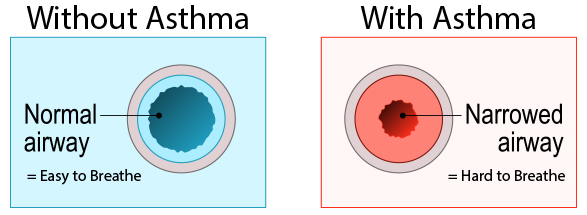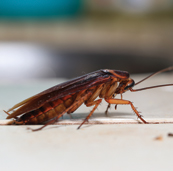Tips for Managing Your Asthma
Asthma is a condition that affects your lungs and can make it hard to breathe.
We understand that living with asthma can be difficult. You don’t have to figure it all out on your own. With the right tools and support, you can feel your best and spend more time doing the things that are important to you.
List of topics:
Understanding Asthma
Asthma is a condition in which your airways narrow, swell, and produce extra mucus. This can make breathing difficult and cause coughing, wheezing, and shortness of breath.
Your lungs with and without asthma:

Why is it important to control your asthma?
When your asthma symptoms are not controlled:
- You may not feel your best
- You may have a hard time doing the things you like to do
What should you consider doing?
- Take an Asthma Control Test to see if your asthma is under control
- If you feel that your asthma symptoms aren’t under control, call your PCP to schedule an appointment and talk to them about how you are feeling
Asthma Control Test
Is your asthma under control? Give the Asthma Control Test a try.
To take this easy test:
- Open the test based on your/your child’s age
- If your score is 19 or less, your asthma may not be under control
What should you consider doing?
Take the test and know your score
Now that you know your score:
- If your score is 20 or more, it means that your asthma is under control
- Continue taking good care of yourself by taking your medications as recommended, managing your triggers, and using your asthma action plan
- If your score is 19 or less, it means that your asthma may not be under control
- Use your asthma action plan. Then, call your provider to discuss your asthma symptoms
Know what gets in your way. . .
Each person has different things that get in the way of taking care of their asthma. The first step is to identify them. What gets in your way or makes it hard for you to take care of your asthma?
The following list may help you get started:
Download: What Gets in Your Way?What should you consider doing?
Help is available to help you overcome these barriers. Make a call to one of the programs listed in the “What Gets in Your Way” document above to get you started.
- Let your provider know what is getting in your way
- If you have a health question and your provider or your provider’s answering service are not available, you can call the 24/7 Nurse Helpline at 1.800.859.9889
- Continue to use this webpage to get information about medications and triggers
Getting the Most Out of Your Asthma Medications
There are two main types of asthma medications that you need to know about: Controller Medications and Rescue Medications.
Controller Medications
Controller medications are medications that you use on a regular basis as prescribed by your PCP. Using this medication as recommended by your PCP can reduce your chance of an asthma attack.
Rescue Medications
Rescue medications are medications that you use when you are having asthma symptoms. Children should use a spacer with their rescue medications. If you need a spacer, talk to your child’s provider.
What should you consider doing?
- Using your inhaler correctly can help you breathe easier, faster.
- Learn more about:
- Practice, or watch your child practice using his/her inhaler and spacer correctly
- If you have any questions or are unsure about how to take asthma medications correctly, talk to your PCP at your next visit. Ask your child’s provider if your child should be using a spacer with their medication
Know your triggers and what to do about them
A trigger makes your asthma worse! Asthma triggers can cause an asthma attack. Each person with asthma has different triggers. When you know your triggers, you can find ways to avoid them.
Common asthma triggers

Here are some ways you can avoid pests:
- Keep food and garbage in closed and sealed containers
- Avoid having piles of paper, boxes, and bags in your home
- Don’t leave water sitting in sinks or pots/pans
- Use roach traps or gels to cut down on the number of cockroaches in your home

Dust mites are tiny bugs that are in almost every home. To avoid dust mites:
- Avoid using down-filled pillows, quilts, or comforters
- Keep stuffed animals out of your bedroom
- Avoid having food or eating in the bedroom
- Wash your bedding on the hottest water setting

Mold grows in places with a lot of moisture, such as around leaks in roofs, windows, or pipes, or where there has been flooding. To avoid mold:
- Be sure your home has enough ventilation. Use exhaust fans which vent outside your home in the kitchen and bathroom. Make sure your clothes dryer vents outside your home
- Fix any leaks in your home’s roof, walls, or plumbing so mold does not have moisture to grow
- Clean bathrooms often
- Remove or replace carpets and upholstery that have been soaked and cannot be dried promptly. Consider not using carpet in rooms or areas like bathrooms or basements that may have a lot of moisture
- If you see mold, wash the mold off hard surfaces and dry completely. Absorbent materials with mold, such as ceiling tiles and carpet, may need to be replaced

Furry pets can trigger an asthma attack. To avoid pet fur:
- Keep your pet out of the person with asthma’s bedroom
- Bathe pets every week and keep them outside as much as you can
- Vacuum often
- If your floors have a hard surface, such as wood or tile, damp mop them every week

Pollen are tiny bits of powder from trees or plants. Here are some ways you can avoid pollen:
- Shower from head to toe before bed
- Check on pollen counts on your favorite weather website
- Try and stay indoors when pollen counts are high
- Use an air conditioner if you have access to one

Tobacco smoke is unhealthy for everyone, especially people with asthma. To avoid tobacco smoke:
- If you smoke, avoid smoking near the person with asthma
- At home, in your car, or wherever the individual with asthma may spend a lot of time
- Ask your provider for help if you want to quit smoking
Making the Right Plan for You
An Asthma Action Plan (AAP) describes the steps needed to best manage your asthma.
You can create an action plan with your primary care provider. Talking about this plan with your PCP can help you feel your best.
In order for you to get the most out of your action plan:
- Keep your rescue inhaler with you at all times
- If your child has asthma, you should give his/her rescue inhaler to the school or other caregivers
Click below to see some sample action plans
What should you consider doing?
- Make an appointment with your provider to discuss your asthma action plan
- Use your asthma action plan daily
- Consider sharing your asthma action plan with your family members and caregivers (school, daycare, other caregivers, parents, grandparents, etc.)
Additional Resources
Are you interested in learning more? For additional information, videos, and resources on asthma, such as a medications chart and instructions on using an inhaler and a nebulizer, please click here.
This portion of the HUSKY Health website is managed by Community Health Network of Connecticut, Inc.®, the State of Connecticut’s Medical Administrative Services Organization for the HUSKY Health Program. For the general HUSKY Health website gateway, please visit portal.ct.gov/husky. HUSKY Health includes Medicaid and the Children’s Health Insurance Program, and is administered by the Connecticut Department of Social Services.



